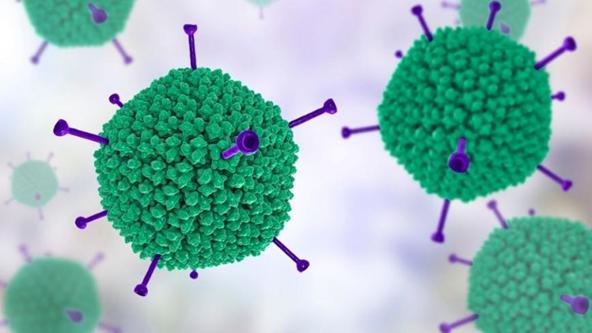Adenovirus, the "King of Poison" with high fever.
Original doctor Zhang Jing breathing angel
Recently, the power of "adenovirus" has exploded among parents. After adenovirus infection, there will be high fever, listlessness, and then pneumonia, or other pathogens such as mycoplasma pneumoniae or bacterial infection, etc. Parents have given adenovirus a new title "Poison King".

Adenovirus is distributed all over the world, which can cause infection all year round, and it is easy to appear in closed or crowded environment. 5%-10% of infantile febrile diseases are caused by adenovirus.
01
What are the manifestations of adenovirus infection in children?
Fever is the most common symptom of adenovirus infection, which is characterized by repeated high fever above 39℃ for 5-7 days, and some cases can last for up to 2 weeks. Many cases may have exudative tonsillitis and cervical lymph node enlargement, so it is difficult to distinguish this syndrome from group A streptococcus infection in clinic. Adenovirus is one of the most common causes of tonsillitis in children. Babies will have symptoms of diarrhea. Epidemic keratoconjunctivitis can occur in some cases, which is manifested as conjunctival congestion and preauricular lymph node enlargement. Severe cases may cause damage to important organs such as pneumonia, encephalitis, meningitis and myocarditis.


02
How to determine adenovirus infection?
Children with recurrent high fever for more than 3 days need to consider the possibility of adenovirus infection. It is suggested to see a doctor in time, and the adenovirus antigen or nucleic acid of nasopharyngeal swab can be detected. The accuracy of adenovirus nucleic acid detection is higher than that of antigen detection. The doctor will make a choice according to the specific situation.

03
Will there be adenovirus infection in adults?
Adults can also be infected with adenovirus. The clinical manifestations of adenovirus infection vary with the age and immune function of the host. The main manifestations of adults are acute upper respiratory tract infection and epidemic keratoconjunctivitis, but adults with low immune function will also have severe important organ involvement.

04
Is there a specific drug for adenovirus?
At present, there is no specific antiviral drug for adenovirus infection, and symptomatic treatment is the main way. Adenovirus is a viral infection, and it does not need to be treated with antibiotics unless the clinician judges that there is mixed infection.
05
Is there a vaccine for adenovirus?
There is no vaccine against adenovirus at present.
06
What conditions do adenovirus infection need to see a doctor?
If there is no basic disease, school-age or older children, adenovirus is usually self-limited. If the symptoms are severe or persistent, it is recommended to see a doctor in time. For premature infants and children with basic diseases, it is recommended to see a doctor in time. Children under 3 years old, especially under 3 months old, who are suspected of adenovirus infection are advised to see a doctor in time. Because of the rapid change of their condition, they may need careful observation by their parents, and if necessary, they may see a doctor several times or stay in hospital for observation. If the child has convulsions, new rash, listlessness, gray complexion, hypoxemia, wheezing, shortness of breath, dyspnea or persistent high fever, it is also necessary to see a doctor in time if the temperature does not drop after using antipyretic drugs. After adenovirus infection, it is very important for parents to carefully observe the symptoms of children and see a doctor in time.
Brief introduction of the author

Deputy Chief Physician Zhang Jing
Dr. Zhang Jing is the deputy chief physician of the Respiratory Department of Shanghai Children’s Medical Center affiliated to Shanghai Jiaotong University School of Medicine, and the secretary of the diagnosis and treatment center for children’s sleep disorders. As a visiting scholar, I went to the Sleep Center of Comer Children’s Hospital of University of Chicago, USA. Participated in many sleep-related topics and published many papers in domestic core journals. Mainly good at the diagnosis and non-surgical treatment of children’s sleep respiratory disorders, pressure titration and follow-up of children’s non-invasive ventilator treatment. The Department of Respiratory Medicine of Shanghai Children’s Medical Center has a specialized clinic for respiratory asthma from Monday to Sunday (including holidays), which mainly treats bronchial asthma, chronic cough, wheezing of infants, refractory pneumonia, pleural effusion, chronic lung disease, interstitial lung disease and other rare and difficult diseases of children’s respiratory system, and provides services for children all year round.
The respiratory department of Shanghai Children’s Medical Center, together with the children’s health department and otolaryngologists, set up a joint clinic for sleep disorders, and established a multi-disciplinary and all-round treatment process for children with sleep disorders to maximize the convenience for children and their parents.
The outpatient clinic of respiratory asthma with integrated traditional Chinese and western medicine consists of Director Xue Zheng of Pediatrics of Shanghai Hospital of Traditional Chinese Medicine, Director Yin Yong of Respiratory Department of Shanghai Children’s Medical Center, and Director Sun Kexing of Chinese Medicine Department of Shanghai Children’s Medical Center. The complex allergic problems of children are solved in one stop, and Chinese medicine is used to improve their physique, while western medicine is used to control asthma symptoms.
Read the original text